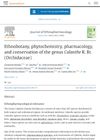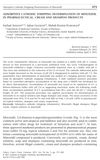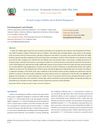 6 citations,
November 2021 in “Journal of Ethnopharmacology”
6 citations,
November 2021 in “Journal of Ethnopharmacology” Calanthe orchids have medicinal potential and contain 265 chemical compounds, but are underexplored.
2 citations,
August 2022 in “Animals” Essential oils may improve dogs' health and melatonin can help with their sleep and anxiety, but both should be used carefully.
[object Object]  1 citations,
January 2019 in “Clinical, Cosmetic and Investigational Dermatology”
1 citations,
January 2019 in “Clinical, Cosmetic and Investigational Dermatology” Jarilla-Coffea extract gel effectively and safely increases eyelash and eyebrow thickness in women.
January 2025 in “Anais Brasileiros de Dermatologia” Male pattern baldness worsens with age and can be treated with medications like minoxidil and finasteride, but side effects and personalized care are important.
 July 2023 in “International Journal of Cosmetic Science”
July 2023 in “International Journal of Cosmetic Science” Biopolymers are increasingly used in cosmetics for their non-toxicity and skin benefits, with future biotech advancements likely to expand their applications.
17 citations,
May 2019 in “Journal of International Medical Research” Xiaoaiping reduces chemotherapy side effects and improves quality of life for breast cancer patients.
30 citations,
August 2021 in “Journal of Ethnopharmacology” Akebia quinata and Akebia trifoliata have many health benefits and potential medical uses.
 33 citations,
July 2021 in “Clinical, Cosmetic and Investigational Dermatology”
33 citations,
July 2021 in “Clinical, Cosmetic and Investigational Dermatology” Nanocarrier technology in cosmetics improves ingredient delivery and effectiveness while reducing side effects.
 September 2024 in “Journal of Cosmetic Dermatology”
September 2024 in “Journal of Cosmetic Dermatology” Follow these guidelines to safely and effectively use energy-based devices in aesthetic treatments.
 May 2017 in “Journal of The American Academy of Dermatology”
May 2017 in “Journal of The American Academy of Dermatology” Combining microneedling with Q-switched laser treatment for tattoo removal did not improve results and caused more pain.
 14 citations,
January 2011 in “International Journal of Trichology”
14 citations,
January 2011 in “International Journal of Trichology” Some people with severe, long-lasting baldness responded well to a specific combination treatment.
 1 citations,
January 2017 in “Social Science Research Network”
1 citations,
January 2017 in “Social Science Research Network” The document suggests creating a secure database for indigenous knowledge and recommends that the TKDL actively fight patents that slightly alter traditional knowledge.
 May 2021 in “Austin journal of pharmacology and therapeutics”
May 2021 in “Austin journal of pharmacology and therapeutics” Physalis fruits have medicinal properties that can help treat various diseases and have anti-inflammatory, antioxidant, antibacterial, and antitumor effects.
 January 2020 in “Nasza Dermatologia Online”
January 2020 in “Nasza Dermatologia Online” A mixture of Dijon mustard, turmeric powder, and linseed oil can effectively treat alopecia barbae.
 January 2019 in “ARC journal of pharmaceutical sciences”
January 2019 in “ARC journal of pharmaceutical sciences” Acne can be managed with various treatments and requires psychological support due to its emotional impact.
 78 citations,
February 2011 in “Canadian Medical Association Journal”
78 citations,
February 2011 in “Canadian Medical Association Journal” Acne treatment varies, with topical and systemic therapies effective, and more research needed on treatment order and long-term effects.
 72 citations,
July 2014 in “American journal of clinical dermatology”
72 citations,
July 2014 in “American journal of clinical dermatology” Some treatments, like corticosteroids and sensitizing agents, can help with alopecia areata, but more high-quality research is needed.
 8 citations,
January 2011 in “Collection of Czechoslovak Chemical Communications”
8 citations,
January 2011 in “Collection of Czechoslovak Chemical Communications” Researchers developed a sensitive method to measure minoxidil in various products with high accuracy.
 3 citations,
August 2021 in “Cutis”
3 citations,
August 2021 in “Cutis” Some alternative medicine treatments might work for skin conditions, but their effectiveness and safety differ a lot.
 1 citations,
December 2023 in “Annals of Phytomedicine An International Journal”
1 citations,
December 2023 in “Annals of Phytomedicine An International Journal” Nanoemulgel improves delivery and effectiveness of plant-based drugs for various conditions.
 October 2023 in “Arab Gulf journal of scientific research”
October 2023 in “Arab Gulf journal of scientific research” The powder shampoo with cinnamon extract has strong antioxidant properties and is eco-friendly.
 August 2023 in “Acta Scientific Veterinary Sciences”
August 2023 in “Acta Scientific Veterinary Sciences” Ivermectin, Vimeral syrup, and Benzyl Benzoate effectively treat sarcoptic mange in rabbits.
[object Object]  126 citations,
April 2015 in “Clinical, cosmetic and investigational dermatology”
126 citations,
April 2015 in “Clinical, cosmetic and investigational dermatology” Choosing the right patients, using proper techniques, and having thorough knowledge are key to preventing and managing dermal filler complications.
 125 citations,
May 2019 in “Phytomedicine”
125 citations,
May 2019 in “Phytomedicine” Cepharanthine is a well-tolerated drug with multiple medical uses, including anti-inflammatory and anti-cancer properties.
 116 citations,
December 2017 in “International Journal of Women's Dermatology”
116 citations,
December 2017 in “International Journal of Women's Dermatology” Adult female acne treatment should be personalized, considering individual preferences and pregnancy, using various topical and oral medications while managing side effects and resistance.
 39 citations,
June 2017 in “Journal of Applied Research on Medicinal and Aromatic Plants”
39 citations,
June 2017 in “Journal of Applied Research on Medicinal and Aromatic Plants” Plant-based ingredients are effective and safe for modern skincare products.
 23 citations,
January 2001 in “International journal of toxicology”
23 citations,
January 2001 in “International journal of toxicology” St. John's Wort extract and oil safety in cosmetics is unclear; more data needed on photosensitization, toxicity, and human irritation.
 17 citations,
October 2003 in “Contact dermatitis”
17 citations,
October 2003 in “Contact dermatitis” Glycerin in hand cream can cause allergic skin reactions.
 5 citations,
January 2017 in “Clinics in Dermatology”
5 citations,
January 2017 in “Clinics in Dermatology” Skin symptoms without a medical cause often reflect psychological stress and are influenced by culture, requiring a team approach for treatment.
 5 citations,
January 2014 in “Current Dermatology Reports”
5 citations,
January 2014 in “Current Dermatology Reports” Many adult women suffer from persistent or late-onset acne, and while various treatments exist, finding the right one can be challenging.


























